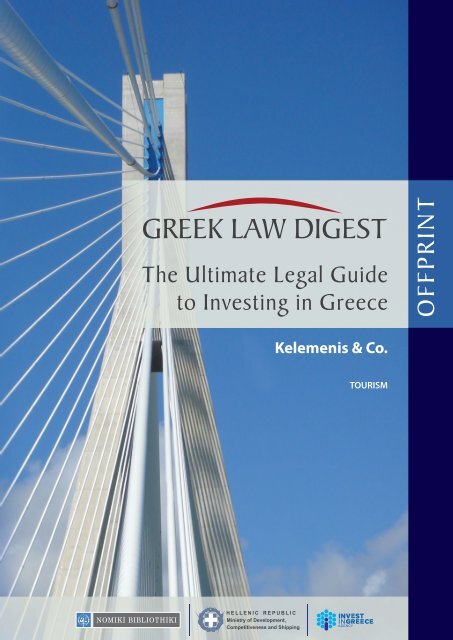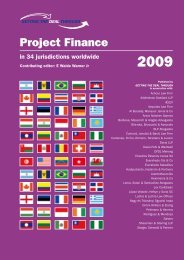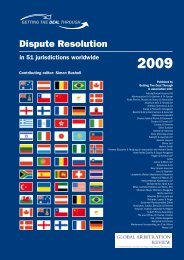Tourism - Greek Public Procurement Lawyers
Tourism - Greek Public Procurement Lawyers
Tourism - Greek Public Procurement Lawyers
You also want an ePaper? Increase the reach of your titles
YUMPU automatically turns print PDFs into web optimized ePapers that Google loves.
Kelemenis & Co.<br />
TOURISM
Editor-in-chief:<br />
Adonis Karatzas (adonik@nb.org)<br />
Editorial board:<br />
Geena Papantonopoulou (geenap@nb.org)<br />
Marina Tsikouri (marinat@nb.org)<br />
Advertising managers:<br />
Georgia Siakandari (georgias@nb.org)<br />
Juliana Berberi (juliber@nb.org)<br />
Art Director:<br />
Theodoros Mastrogiannis (mastroth@nb.org)<br />
Creative Director:<br />
Andreas Menounos (andreasm@nb.org)<br />
Desktop Publishing – Films:<br />
Yannis Dedousis (yannisd@nb.org)<br />
GREEK LAW DIGEST<br />
ISSN 2241-133X<br />
www.greeklawdigest.gr<br />
NOMIKI BIBLIOTHIKI SA, © 2012<br />
COPYRIGHT<br />
The content of this Guide is copyright of NOMIKI<br />
BIBLIOTHIKI S.A. Copying of part or all of the<br />
content of the Guide in any form is prohibited<br />
other than that in accordance with the following<br />
permission: a) you may copy pages from the<br />
Guide for your personal use only, b) you may recopy<br />
extracts from the Guide to indi vidual third<br />
parties for their personal information, but only if<br />
there is acknowledgment to NOMIKI BIBLIOTHIKI<br />
S.A. as the copyright owner of the Guide.<br />
DISCLAIMER<br />
The content of this Guide is intended for information<br />
purposes only and should not be treated<br />
as legal advice. The publication is necessarily<br />
of a general nature; NOMIKI BIBLIOTHIKI S.A.<br />
makes no claim as to the comprehensiveness or<br />
accuracy of the Information provided; Information<br />
is not offered for the purpose of providing<br />
individualized legal advice. Professional advice<br />
should therefore be sought before any action<br />
is undertaken based on this publication. Use<br />
of this Guide does not create an attorney-client<br />
or any other relationship between the user and<br />
NOMIKI BIBLIOTHIKI S.A. or the legal professionals<br />
contributing to this publication.<br />
23, Mavromichali Str., 106 80 Athens Greece<br />
Tel.: +30 210 3678 800 • Fax: +30 210 3678 857<br />
e-mail: info@nb.org<br />
http://www.nb.org<br />
CONTENTS<br />
Useful insights of the <strong>Greek</strong><br />
Economic Environment ...................................................................16<br />
Judicial System ........................................................................................33<br />
Basic Aspects of Civil Law ..............................................................75<br />
Business Entities .................................................................................111<br />
Banking System - Finance - Investment .......................185<br />
Mergers & Acquisitions .................................................................243<br />
Financial Contracts............................................................................275<br />
Financial Tools .......................................................................................299<br />
Competition ............................................................................................313<br />
Industrial & Intellectual Property Rights ......................337<br />
Transportation.......................................................................................355<br />
Insurance ....................................................................................................403<br />
Insolvency - Bankruptcy ..............................................................411<br />
<strong>Tourism</strong>.........................................................................................................425<br />
Technology - Media - Electronic<br />
Communications ................................................................................433<br />
Energy ...........................................................................................................467<br />
Environment ...........................................................................................505<br />
Real estate .................................................................................................571<br />
Food & Beverage .................................................................................589<br />
Life sciences .............................................................................................597<br />
Consumer protection .....................................................................605<br />
Pesronal data ..........................................................................................611<br />
Lottery – Games ...................................................................................619<br />
Sports Law.................................................................................................625<br />
Employment ............................................................................................633<br />
Immigration .............................................................................................653<br />
Exports / Imports/ Customs .....................................................661<br />
Tax .....................................................................................................................667<br />
Legal profession in Greece ........................................................703<br />
Related information .........................................................................705
TOURISM
What is the licensing procedure for the establishment of hotels?<br />
The procedure that needs to be followed for the issue of a hotel license in Greece<br />
includes six stages:<br />
issue of a preliminary environmental approval. This approval is required only for<br />
territories outside town planning zones and is issued by the Regional Directorates<br />
of Urban Planning, unless another authority is competent, depending on the area<br />
where the hotel will be established;<br />
approval of the suitability of the plot where the hotel will be built which is issued<br />
by the Regional Directorates for <strong>Tourism</strong>;<br />
approval of environmental terms. Depending on the location and size of the hotel,<br />
said approval is issued by either the Regional Environmental Authorities or the<br />
Prefecture of Athens or Thessaloniki, or the Regional Directorate of Environment or<br />
the Prefectural Office of Environment;<br />
approval of the architectural designs by the Regional Directorates of <strong>Tourism</strong>;<br />
issue of a building permit by the Directorate of Urban Planning of the Prefecture or<br />
Municipality where the hotel will be located; and<br />
issue of the operation license by the Regional Directorates of <strong>Tourism</strong> of the<br />
Hellenic <strong>Tourism</strong> Organization (EOT).<br />
What is the licensing procedure for the establishment of conference centers?<br />
In order for a conference center to obtain a license, the following procedure needs to be<br />
followed:<br />
a study on the purpose of establishment of the conference center must be<br />
approved by the competent Directorate of EOT;<br />
approval of the suitability of the plot by the competent authority of EOT; with said<br />
approval EOT may require documents and approvals from various authorities (e.g.<br />
approval from the Ministry of Culture and <strong>Tourism</strong>, an opinion form the antiquities<br />
authorities etc.);<br />
approval of architectural designs by the Regional Directorate of <strong>Tourism</strong>;<br />
issue of a building permit by the competent Urban Planning Authority;<br />
issue of all other relevant urban planning and environmental permits/<br />
authorisations/approvals set out in urban planning and environmental legislation;<br />
a study, approved by the competent Urban Planning Office, with regard to<br />
the sound-proof/sound-protection and the acoustics of the room(s) must be<br />
submitted with EOT;<br />
426<br />
TOURISM<br />
Ioanna Lazaridou, LL.M.<br />
Partner at Kelemenis & Co.
the procedure for the establishment of a conference center is completed once the<br />
operation license is issued by EOT.<br />
What is the licensing procedure for the establishment of golf courses?<br />
The following procedure must be followed for the establishment of a golf course:<br />
approval of the suitability of the plot by the competent authority of EOT. Together<br />
with the application for said approval, a pre-approval regarding the location of the<br />
golf course and an approval of the environmental impact study by the Ministry of<br />
Environment must be submitted;<br />
approval of an architectural study by EOT in relation to which the procedure<br />
followed for hotels is applicable;<br />
issue of a building permit by the competent Urban Planning Authority;<br />
issue of an operation license by EOT.<br />
What are the technical compliance standards that govern hotels regarding fire safety?<br />
The key provisions on fire protection and fire safety standards are prescribed in<br />
Presidential Decree 71/1988 “Regulation on the Fire Protection of Buildings” (Fire<br />
Regulation), as interpreted by Ordinance No 39112 F.701.2/12.10.1998 of the Fire Brigade<br />
Headquarters “On Codification of Clarifying Ordinances issued by the Fire Brigade<br />
Headquarters on the Application of Presidential Decree 71/1988” and various other<br />
Ordinances of the Fire Brigade Headquarters, as in force. Before the Fire Regulation<br />
entered into force, the fire protection of hotels was regulated by Ordinance 2/1979 of the<br />
Fire Brigade Headquarters “On the basic measures of fire protection in hotels”, which may<br />
still be applicable on hotels which have received their fire certificate under this Ordinance.<br />
According to the Fire Regulation, as amended and in force, hotels are divided into the<br />
following two categories:<br />
“New Hotels”, i.e. hotels whose building permit was issued after 24.10.2006, and<br />
“Existing Hotels”, i.e. hotels which had already been constructed or had been in<br />
operation by 24.10.2006.<br />
The Fire Regulation’s provisions refer to the following issues:<br />
escape routes in case of fire, i.e. stairways and emergency exits;<br />
passive fire protection, i.e. the terms of structural formation of a building which<br />
may ensure its fire protection by preventing either the beginning or the spreading<br />
of fire in the building; for instance, the fire resistance index of structural material of<br />
the building, the division of a building into fire departments etc;<br />
active fire protection, i.e. the measures to be taken by the hotel against fire; for<br />
instance, fire alarm systems, fire-detection systems, fire-extinguishing systems;<br />
various other measures such as the training of employees to react accordingly<br />
in case of fire, the hanging of signs showing the ground plan of the hotel and/or<br />
information on the orientation of the building etc.<br />
The Fire Regulation includes similar rules also for shops, meeting rooms and parking areas<br />
which are located within hotels. A Certificate of Fire Protection must be issued by the<br />
competent Department of the Fire Brigade. Although this Certificate is necessary for the<br />
operation of all hotels, different provisions may be applicable for New and Existing Hotels.<br />
Kelemenis & Co.<br />
427
What is the nature of allotment contracts? What are the main rights and obligations of the<br />
contracting parties?<br />
Decision 503007/29.11.1976 of the General Registrar of EOT (Contracts Regulation)<br />
regulates the relationships between (a) hoteliers and individual clients and (b) hoteliers<br />
and travel agents. The Contracts Regulation has been formally ratified by article 8 of<br />
statute 1652/1986. According to article 5 of said statute, any issue regarding allotment<br />
contracts that is not specifically set out in the Contracts Regulation, is governed by the<br />
general provisions of the <strong>Greek</strong> Civil Code.<br />
Allotment contracts, i.e. contracts entered into between hoteliers and travel agents or<br />
groups for the booking of a number of beds for a specific period, must at least contain<br />
the following provisions:<br />
the agreed price for an overnight stay, the price for a bed & breakfast (BB) stay, the<br />
price for a half-board (HB) stay and the price for an all-inclusive (AI) stay;<br />
the type of rooms (single, twin etc.), the exact duration of the allotment and the<br />
agreed maximum and minimum allotment for every month;<br />
the agreed breakfasts and double-dot meals must be offered at a price and<br />
according to the standards of the applicable market rules;<br />
hotels within the premises of which no restaurants or canteens operate may not<br />
conclude allotment contracts on a BB, HB or AI basis;<br />
restaurants and canteens within the hotel’s premises may not be leased or<br />
subleased to persons other than those running the hotel business meaning that<br />
the responsibility for the operation of the business must cover all departments of<br />
the hotel unit.<br />
The hotelier may request a down-payment of 25% of the entire amount payable by<br />
the counterparty on the basis of the allotment contract. In case the hotelier breaches<br />
the agreement, he/she/it is under an obligation to immediately refund the downpayment<br />
plus interest. Such breach of the hotelier may also result in administrative<br />
penalties being imposed on him/her/it by EOT. In case the travel agent does not cover<br />
the minimum allotment in a month, the hotelier is entitled to compensation which is<br />
calculated on the basis of the agreed price for a one-night stay and amounts to half of<br />
the minimum uncovered balance of the allotment.<br />
With regard to cancellations, a travel agent may cancel part or all of the agreed allotment<br />
without bearing an obligation to compensate the hotelier if the hotelier is notified<br />
of such cancellation at least 21 days prior to the agreed arrival of the guests (release<br />
period). Nonetheless, with its decision 38/1997 the Supreme Court has ruled that in<br />
case the travel agency does not cover the minimum allotment, it must compensate<br />
the hotelier for half of the minimum uncovered balance of the allotment, regardless of<br />
whether it has notified the hotelier 21 days prior to the agreed arrival of the guests. The<br />
hotelier also has the right to be released 21 days prior to the agreed arrival in relation<br />
to bookings for which he/she/it has received no confirmation by either a voucher or a<br />
rooming list. If the travel agent makes use of its cancellation right, pursuant to the above,<br />
during the low season, the hotelier has the right to proportionally limit the allotment of<br />
beds during the high season without, nonetheless, falling below the minimum allotment<br />
of the relevant month.<br />
428
What is the nature of guarantee (commitment) contracts?<br />
The Contracts Regulation applies not only to allotment contracts but also to guarantee<br />
(commitment) contracts. The main difference between allotment and commitment<br />
contracts is that in the case of commitment contracts the agreement refers to a specific<br />
number of beds during a specific time period, i.e. it does not provide for a maximum<br />
and minimum number of beds. In the case of commitment contracts, if the travel agent<br />
cancels the agreement for part or all of the agreed beds, it has to pay the price for all the<br />
beds it has booked, unless it has notified the hotelier 21 days prior to the arrival of the<br />
guests (release period).<br />
What is the nature of time-sharing contracts?<br />
Time-sharing contracts are regulated by statute 1652/1986 “Leasing agreements and<br />
regulation of relevant issues”, as it has been modified by Presidential Decrees 182/1999<br />
and 293/2001. In the case of time-sharing contracts, the lessor undertakes the obligation<br />
to supply the lessee with the use of the accommodation for a specific period every year<br />
together with certain relevant services and the lessee undertakes to pay the agreed rent.<br />
Time-sharing contracts include elements of several types of contracts, although those of<br />
a leasing agreement prevail. This is the reason why statute 1652/1986 provides that the<br />
articles of the Civil Code regulating leasing agreements are applicable in addition to the<br />
provisions of the statute.<br />
Time-sharing contracts may have a duration of between 3 and 60 years and must<br />
be concluded with a notarial deed which must subsequently be registered with the<br />
competent land registry. The observation of such formalities aims at protecting both the<br />
lessee and third parties who can thus gain knowledge of the long-term restrictions of<br />
such properties.<br />
What is the legal framework of package travels?<br />
Package travels are regulated by Presidential Decree 339/1996 “On package travel,<br />
in compliance with Directive 90/1314/EEC on package travel, package holidays and<br />
package tours”. The aim of the Directive was to harmonize national legislations on<br />
package travels with regard to consumer protection. Whilst Directive 90/1314/EEC<br />
regulates the content, execution and termination of a package travel contract, it does<br />
not regulate civil liability issues that may arise thereof, for which the legislation of<br />
member states must provide. The regulation of package travel contracts by Decree<br />
339/1996 is only fragmentary due to the fact that it almost immutably transfers the rules<br />
of Directive 90/314/EEC into the <strong>Greek</strong> legal framework, without addressing the issues<br />
that are not regulated by said directive. Thus, in order to cover legislative gaps (e.g.<br />
contractual liability) certain provisions of the <strong>Greek</strong> Civil Code are applied.<br />
How are (a) hotels and (b) rented rooms and rented furnished apartments categorized?<br />
Presidential Decree 43/2002 “On the classification of the main hotel accommodations<br />
according to a star rating system and relevant technical provisions” introduces a new<br />
system of classification, according to which main hotel accommodations are divided into<br />
the following categories: (a) ordinary hotels, (b) motels, (c) furnished apartments and (d)<br />
mixed type-hotels. There exist five star categories in total; hotels are ranked based on a<br />
system of compulsory standards and graded criteria. Decree 43/2002 includes rules for<br />
Kelemenis & Co.<br />
429
430<br />
both technical and functional standards so that consumers may identify the quality of<br />
both the accommodation and the available services.<br />
According to Presidential Decree 337/2000 “On the classification of rented rooms and<br />
rented furnished apartments according to a keys system” there exist four categories<br />
according to which rented rooms and rented furnished apartments are ranked. The<br />
ranking criteria are divided into the following categories: (a) the minimum compulsory<br />
requirements regarding equipment and services for the keys-categories, (b) the<br />
minimum compulsory requirements for every key-category and (c) ranked criteria.<br />
What is the employment status of hotel employees?<br />
The employment regime of employees at hotels that operate for a period of up to 9<br />
months annually (seasonal hotels) is regulated by special provisions, those being:<br />
article 8 of Statute 1346/1983;<br />
the collective labor agreements for all hotel employees;<br />
the codification of provisions applicable for all hotel employees; and<br />
statute 2112/1920 on the termination of employment contracts of employees in<br />
the private sector.<br />
The employment contract of hotel employees is a “peculiar” contract of fixed duration.<br />
Its “peculiarity” lies in the fact that, contrary to regular fixed duration contracts, the<br />
employee has the right to be rehired and the employer is under an obligation to rehire<br />
the employee provided that the latter follows the procedure prescribed by law [i.e.<br />
gives notice to the employer by the 30th of January by email, registered mail or fax that<br />
he/she wishes to be rehired (even oral notice may be considered valid if it is standard<br />
practice)]. Moreover, the employer is under an obligation to employ the same number of<br />
employees and, more specifically, the same employees that he employed during the last<br />
period of operation of the hotel. Rehiring must take place gradually as follows:<br />
upon reaching 20% of hotel occupancy, 1/3 of the employees must be rehired;<br />
upon reaching 50% of hotel occupancy, at least 2/3 of the employees must be rehired;<br />
upon reaching 80% of hotel occupancy, the total number of employees must be<br />
rehired.<br />
With regard to the end date by which all employees must be rehired, this varies<br />
depending on the location of the hotel.<br />
With regard to severance payment, it has been under dispute whether the “dead period”,<br />
i.e. the period during which the hotel is closed, should be taken into account when<br />
calculating the amount of the severance payment. This matter has been dealt with<br />
frequently by the Supreme Court, the most recent occasion being decision 305/2011,<br />
which ruled that the “dead period” should not be taken into consideration when<br />
calculating severance payment of hotel employees.<br />
How does the new incentives law 3908/2011 apply to hotels? Under which conditions can<br />
the establishment/expansion/renovation of a hotel fall under the provisions of the above<br />
statute?<br />
Statute 3908/2011 (“On the Support of Private Investments to promote Economic<br />
Growth, Entrepreneurship and Regional Cohesion”) aims at enhancing economic growth<br />
in Greece by supporting investment plans of new and existing businesses. According to
said statute, three types of support are available, namely tax exemption, state grant and<br />
subsidization of leasing contracts.<br />
With regard to hotels, only certain types of investment plans may be considered eligible<br />
to come under the provisions of the incentives law:<br />
those which relate to the establishment, expansion or renovation of an integrated<br />
hotel unit categorized as at least a three-star hotel or one to be upgraded to an at<br />
least three-star hotel;<br />
investments related to health tourism;<br />
investments relating to the conversion of traditional or national heritage buildings<br />
to hotel facilities of a category of at least three-stars;<br />
investments regarding the renovation of hotel facilities that operate within<br />
traditional or national heritage buildings.<br />
In order for an investment plan relating to the establishment or expansion of a hotel<br />
unit to come under the provisions of the incentives law, the applicant must either own<br />
the property or have leased it for a period of at least 15 years. Said lease agreement<br />
must be registered with the competent land registry. The law does not make reference<br />
to renovation of hotel units; as a result, such registration does not apply to renovation<br />
works.<br />
KELEMENIS & CO.<br />
5, TSAKALOF STREET<br />
10673 ATHENS<br />
Tel.: +30 210 36 12 800<br />
Fax: +30 210 36 12 820<br />
E-mail: enquiries@kelemenis.com<br />
Url: www.kelemenis.com<br />
Languages<br />
English, French, German, <strong>Greek</strong>, Italian<br />
Number of lawyers: 26<br />
Contact<br />
Tom Kyriakopoulos<br />
Member<br />
Multilaw, First Law International,<br />
British Hellenic Chamber of Commerce,<br />
<strong>Greek</strong> American Chamber of Commerce,<br />
<strong>Greek</strong> French Chamber of Commerce,<br />
Institute of Energy of Southeast Europe,<br />
IBA<br />
AREAS OF PRACTICE<br />
Litigation and dispute resolution<br />
Dr Yannis Kelemenis<br />
Margarita Matsi<br />
Corporate<br />
Iro Stamataki<br />
Energy and natural resources<br />
Dr Yannis Kelemenis,<br />
Konstantina Soultati<br />
EU, regulation and trade<br />
Ioanna Vourvoulia<br />
Employment<br />
Konstantinos Thomopoulos<br />
SEE transition economies<br />
Tom Kyriakopoulos<br />
Competition<br />
Dr Polykarpos Adamidis<br />
Insurance<br />
Konstantina Soultati<br />
Environmental & Urban Planning<br />
Eirini Sartzetaki<br />
M&A<br />
Ioanna Lazaridou<br />
Commercial<br />
Iro Stamataki<br />
<strong>Tourism</strong><br />
Ioanna Lazaridou<br />
Insolvency/Restructuring<br />
Thenia Economou<br />
Corporate Governance<br />
Kalliope Vlachopoulou<br />
Real estate<br />
Manolis Troulis<br />
Corporate Tax<br />
Tom Kyriakopoulos<br />
Indirect Tax<br />
Eleni Pitsa<br />
Tax & Administrative<br />
Litigation<br />
Marianna Niavi<br />
Kelemenis & Co.<br />
431





